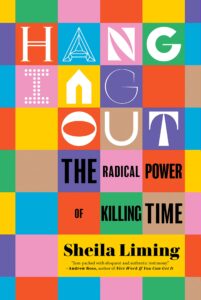Living Inside the Simulation: Sheila Liming on Authenticity and Being on Reality TV
“Reality television borrows from a generalized understanding of what life is like.”
I once had a friend who was famous and, because she was famous, hanging out with her always meant hanging out twice. We would do it once for ourselves—or if not purely for ourselves, then because we knew that hanging out was socially called for, was necessary. Then we would do it all over again, for the cameras.
Back when my friend first became my friend, it wasn’t like this. We first met at a farmers’ market in Grand Forks, the town in which we both lived at the time. I had recognized her from the internet; she had a successful food blog and, in the months that preceded my relocation to North Dakota, I’d been studying up and trying to figure out what hanging out looked like in the place that was soon to be my home.
That led me to her blog, which was dedicated to the juxtaposition of scenes of Midwestern farm life alongside recipes and gossipy anecdotes. Then, one day at the farmers market, I was standing behind her in a checkout line, my arms filled with zucchini. She and I talked, exchanged numbers, and made plans to get together.
And at first, it was all very normal, consisting of dinner parties and the observation of minor holidays, like the Super Bowl. My friend introduced me to hotdish, which is a kind of casserole topped with Tater Tots that is much cherished throughout the upper Midwest. She wasn’t from there originally, but hotdish heritage ran deep on her husband’s side of the family.
The first time I ever lifted a forkful of the stuff to my mouth, I was sitting at my friend’s kitchen table, in the house that she shared with her husband, a sugar beet farmer just like his father and his grandfather—the man who built the house we were sitting in—had been. Hanging out with my friend and her husband granted exposure to a kind of crash course in Midwestern culture: not just hotdish but cookie salad, beet harvest “campaigns,” bison vs. buffalo, and why Midwesterners never enter anyone’s house through the front door, that is, not unless they’re selling something.
But then my friend, who was already a little bit famous, became for-real famous with the launch of her very own Food Network reality TV show. For the pilot episode, which was pitched to the network in the hopes of securing a first season’s contract, we all played at the work of hanging out, inhabiting hypothetical versions of the people we’d previously tried to be in each other’s company. It was exhilarating and also anxious-making; my emotions, I felt, were larger and more pronounced than they might be under normal circumstances. They seemed to take up extra space in the room.
For the pilot episode, which was pitched to the network in the hopes of securing a first season’s contract, we all played at the work of hanging out, inhabiting hypothetical versions of the people we’d previously tried to be in each other’s company.The pilot was supposed to be structured around the idea of a Super Bowl party, except we couldn’t call it the Super Bowl due to copyright concerns and it was filmed in the fall, months away from the date of the actual game. As participants, we were directed to wear certain colors, act certain ways, and say certain things about the food, which was supposed to have been cooked by my friend but actually wasn’t, and which was presented to us and then immediately whisked away, for efficiency’s sake, so we could move on to the work of commenting on whatever came right after it.
There were parts of this experience that might have passed for routine. I’d spent two Super Bowls in my friend’s living room, ingesting her husband’s praise for the Patriots along with hotdish, Scotch eggs (this was a phase for my friend), and deep-fried cheesy pickles. As a result, hanging out in front of television cameras came with a sense of predetermined choreography. I knew what to do because I had done it all before, sort of.
But the circumstances were dramatically different this time: there were professional studio lights looming over us, making us sweat, and microphones tucked into our bras. And there were the repeated requests to Say that thing you just said again, but say it while looking over here, this way. All of this conspired to rupture the semblance of routine that I had counted on to instill confidence. You never think about how difficult it is to cut a Scotch egg and gracefully ferry a piece of it toward your mouth until you have to do so in front of a bunch of cameras.
My friend’s reality TV show became a hit and, in time, the doubleness that came with it started to set in and make itself at home in our lives, to the point where we stopped questioning it, at least out loud. There were two birthdays, two baby showers, two Super Bowls, two hybrid Thanksgiving-Hanukkah parties. One of each, it was assumed, was always supposed to be the real one, which made the other one necessarily less-than-real by default. But we didn’t acknowledge this.
I was never directly told to pretend to celebrate someone’s birthday or to act like it was the Super Bowl when it actually wasn’t: words like pretend and act never bubbled up through the layers of discourse that surrounded these occasions, though they made up a weighty and unavoidable part of the subtext lurking beneath them. Instead, I would receive invitations from the show producers—never from my friend, not anymore—in my email inbox asking if I wanted to be present for a “meal.” If I said yes, I would then receive instructions about where to go, what to wear, how to style my hair and makeup, and how much time (sometimes it could be as much as eight hours) to block out of my schedule for the observance of said meal.
Uncanny is the word that comes to mind when I think of what it meant to hang out with my friend on television in this way, but it’s not a perfect word. Rather, it’s a word that people tend to use when they can’t explain something, because the word itself conjures the unexplainable. Sigmund Freud, who popularized the use of the word (or its German language equivalent), actually had something rather specific in mind: “The uncanny is that class of the frightening which leads back to what is known of old and long familiar.”
What is unnerving about the experience is that it brings one into contact with what should be but has never properly been—an idealized vision of friends, life, interconnection, and hanging out.It’s true that, in hanging out with my friend on TV, in front of a crew of lighting and sound engineers and cameras and producers, I felt like I was returning to something. But it’s untrue that the thing itself was something familiar and known to me, something that already existed and could be plucked from a bank of remembered experiences.
For Freud, it’s the gap between familiarity and foreignness that breeds monstrousness. Between those two poles exists a chasm of sorts, as Freud sees it, and that’s where monstrosity slips in and takes up residence. One can recognize it by its scent, which arises from a confusing mix of the smells of home combined with foreign, slightly feral vapors.
This is sort of like the feeling that comes from being recruited to participate in a scene of staged sociality like the kind that happens on reality TV. What is unnerving about the experience is that it brings one into contact with what should be but has never properly been—an idealized vision of friends, life, interconnection, and hanging out. That vision is not exactly “known of old and long familiar,” to recall Freud’s words, because it is entirely unknown to us outside the bounds of TV itself. We are familiar with it as a simulation, yes, but we have never known or experienced it as a literal reality. We have never been there before, though we’ve seen it mentioned on signs and maps.
The essayist Mark Greif tries to explain this feeling: “There is a persistent dream that television will be more than it is: that it will not only sit in every home, but make a conduit for those homes to reach back to a shared fund of life.” That persistent dream is the dream of company, of hanging out; it is the dream of living a life that takes place within a safe, self-curated enclosure that nevertheless connects and hooks up to shared, social experience.
Greif actually mentions the Food Network and its specific brand of reality shows when he complains of “five hundred channels of identical fluff, network reruns, syndicated programs, second-run movies, infomercials, and home shopping.” Thirty years ago, he says, no one could have dreamed of paying for, let alone enjoying, all that identical content. But to see it in this way is to overlook the cyclicality and repetition that reigns over the idea of hanging out itself.
Reality television shows—including my friend’s—enact these cycles, allowing them to happen again and again and under grander terms than they would normally, injecting freshness into each new instance of ritual. This is why so many viewers feel comforted by them: they know what to expect and, unlike with actual social situations, the results can be counted on. Rarely can our interactions with real, live people yield the luxury of such certitude.
“Our culture is obsessed with real events because we experience hardly any,” writes the author and textual collage artist David Shields. He writes them even though, strictly speaking, these are not his words to write. Rather, he borrows them—Shields is forever borrowing, appropriating, and layering in his work—from two sources: Andrew O’Hehir, writing in Salon, and also from the essayist Frank Rich, who Shields thought he was borrowing from until he traced the line back to O’Hehir. The notion expressed in it strikes me as at least half true where reality television is concerned. Like Shields himself, reality television borrows from a generalized understanding of what life is like. That understanding is contained in stories, which is what reality television then tries to manufacture.
Hanging out—real hanging out—is also about stories; in fact, it consists mostly of them. It’s a process that sees old stories getting launched into recirculation at the same time that new ones are brought into being. But when you’re hanging out on television, for television, the story is already set for you. The element of invention is just a tease, much like the food that kept getting placed in front of me and then taken away again. The result is a kind of impasse, a fixed state of being in which old stories cannot get told and swapped and new ones can’t get made. Instead of either, everyone’s focus is consumed by a knowledge of the story they’re supposed to be telling, the one that isn’t even true. It’s the Super Bowl! (It’s October.) It’s Hanukkah! (It’s April.) It’s a baby! (Again—we did this last weekend.)
________________________________

Excerpted from Hanging Out by Sheila Liming, available from Melville House




















